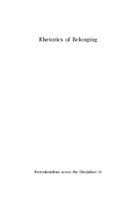Rhetorics of Belonging - Nation, Narration and Israel/Palestine
| dc.contributor.author | Bernard, Anna | |
| dc.date.accessioned | 2018-06-27 23:55 | |
| dc.date.accessioned | 2014-03-10 00:00:00 | |
| dc.date.accessioned | 2020-04-01T14:47:41Z | |
| dc.date.available | 2020-04-01T14:47:41Z | |
| dc.date.issued | 2013 | |
| dc.identifier | 469301 | |
| dc.identifier | OCN: 875673222 | en_US |
| dc.identifier.uri | http://library.oapen.org/handle/20.500.12657/33469 | |
| dc.description.abstract | Describes the formation and operation of a category of Palestinian and Israeli 'world literature' whose authors actively respond to the expectation that their work will 'narrate' the nation, invigorating critical debates about the political and artistic value of national narration as a literary practice. The crisis in Israel/Palestine has long been the world’s most visible military conflict. Yet the region’s cultural and intellectual life remains all but unknown to most foreign observers, which means that literary texts that make it into circulation abroad tend to be received as historical documents rather than aesthetic artefacts. Rhetorics of Belonging examines the diverse ways in which Palestinian and Israeli world writers have responded to the expectation that they will ‘narrate’ the nation, invigorating critical debates about the political and artistic value of national narration as a reading and writing practice. It considers writers whose work is rarely discussed together, offering new readings of the work of Edward Said, Amos Oz, Mourid Barghouti, Orly Castel-Bloom, Sahar Khalifeh, and Anton Shammas. This book helps to restore the category of the nation to contemporary literary criticism by attending to a context where the idea of the nation is so central a part of everyday experience that writers cannot not address it, and readers cannot help but read for it. It also points a way toward a relational literary history of Israel/Palestine, one that would situate Palestinian and Israeli writing in the context of a history of antagonistic interaction. The book’s findings are relevant not only for scholars working in postcolonial studies and Israel/Palestine studies, but for anyone interested in the difficult and unpredictable intersections of literature and politics. This title was made Open Access by libraries from around the world through Knowledge Unlatched. | |
| dc.language | English | |
| dc.relation.ispartofseries | Postcolonialism Across the Disciplines | |
| dc.subject.classification | thema EDItEUR::N History and Archaeology::NH History::NHT History: specific events and topics::NHTR National liberation and independence | en_US |
| dc.subject.other | middle east | |
| dc.subject.other | history | |
| dc.subject.other | politics | |
| dc.subject.other | Allegory | |
| dc.subject.other | Arabs | |
| dc.subject.other | Israeli–Palestinian conflict | |
| dc.subject.other | Israelis | |
| dc.subject.other | Palestinians | |
| dc.subject.other | Rhetoric | |
| dc.subject.other | State of Palestine | |
| dc.subject.other | Zionism | |
| dc.title | Rhetorics of Belonging - Nation, Narration and Israel/Palestine | |
| dc.type | book | |
| oapen.identifier.doi | 10.5949/liverpool/9781846319433.001.0001 | |
| oapen.relation.isPublishedBy | 4dc2afaf-832c-43bc-9ac6-8ae6b31a53dc | |
| oapen.relation.isFundedBy | b818ba9d-2dd9-4fd7-a364-7f305aef7ee9 | |
| oapen.relation.isbn | 9781781386088 | |
| oapen.collection | Knowledge Unlatched (KU) | |
| oapen.pages | 208 | |
| oapen.place.publication | Liverpool, UK | |
| oapen.grant.program | KU Pilot | |
| oapen.remark.public | Relevant Wikipedia pages: Allegory - https://en.wikipedia.org/wiki/Allegory; Arabs - https://en.wikipedia.org/wiki/Arabs; Israeli–Palestinian conflict - https://en.wikipedia.org/wiki/Israeli%E2%80%93Palestinian_conflict; Israelis - https://en.wikipedia.org/wiki/Israelis; Palestinians - https://en.wikipedia.org/wiki/Palestinians; Rhetoric - https://en.wikipedia.org/wiki/Rhetoric; State of Palestine - https://en.wikipedia.org/wiki/State_of_Palestine; Zionism - https://en.wikipedia.org/wiki/Zionism |

